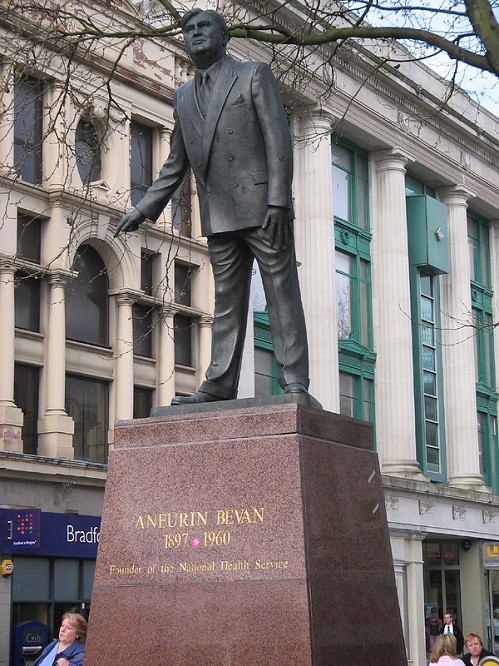Aneurin Bevan’s writings still have lessons for contemporary politics – and far beyond the NHS

Nye Davies, lecturer at School of Law and Politics, Cardiff University
The NHS will turn 75 this year, a considerable legacy for the person responsible for establishing the service, Aneurin Bevan. But Bevan’s political career encompassed far more than this one achievement.
When today’s politicians talk about Bevan’s values or principles, these references often do not go beyond his ambition to make the NHS free at the point of delivery. While this was essential to Bevan, there is a tendency to overlook his wider principles. And by only focusing on the NHS, we run the risk of oversimplifying a complex figure.
One way of uncovering Bevan’s wider political philosophy is to explore his voluminous writings in the socialist magazine, Tribune, for which he wrote more than 300 articles between 1937 and 1960. My new book, This Is My Truth: Aneurin Bevan in Tribune, includes 72 of these articles. It provides an opportunity to delve deeper into Bevan’s philosophy and to critically engage with his ideas and their relevance to contemporary politics.
In his writings, Bevan voiced his belief in parliamentary democracy, his critique of capitalism and his reflections on class conflict. Bevan saw capitalism as a system of “crystal gazing” based on “gambling and speculation”, with pernicious effects that led to class conflict pervading all forms of political debate. For Bevan, “the class struggle is the underlying motif of politics”.
Conflict
In waging class conflict, Bevan believed that parliament was “one of the weapons of the general interest” in the “struggle between the sectional and the general interest or between Property and the People, which is endemic in capitalist society”. He insisted that the “more effectively Parliament asserts the general against the sectional interest the more bitter grows the conflict between the People and Property”.
Bevan was often at loggerheads with the Labour leadership over the extent to which parliament could (or should) seek to achieve radical change. As shown by the articles in the collection, Bevan used the pages of Tribune to state his case during Labour’s ideological disputes, particularly after 1951, when the party entered opposition and began a period of soul searching. He used Tribune to vent his frustrations at those in Labour whom he accused of failing to pursue socialist policies with enough vigour.
Beyond domestic politics, the collection demonstrates Bevan’s ambition to apply his principles of democratic socialism to the international arena. To achieve peace and foster international cooperation, Bevan argued that the “institutions of peace must be strengthened and clothed with power and dignity”.
He also insisted that large countries needed to put their war machines in reverse and reallocate that money to economically poorer nations in the hopes of waging a “resolute attack on world poverty”.
Bevan today
Although the world has moved on significantly since Bevan’s time, many of the issues he grappled with remain relevant today. In the UK, politicians, activists and the public are still debating Labour’s ideological positioning, the ability of parliament to achieve radical change and the correct role for the state in the economy. In international politics, the world is still ravaged by war, power politics and global poverty.

It is important to be careful, however, when trying to interpret the works of historical figures. There is a tendency to pick and choose the elements that fit particular narratives while ignoring those that do not. Bevan is not immune to criticism. Insisting on the need to re-engage with his writing does not mean that he was correct or that he has all of the answers to our current situation.
But it is crucial to return to figures like Bevan in greater detail and to critically engage with their ideas. By doing so, we might find lessons that are relevant today, and avoid reducing significant political figures to snappy one-liners and quotable lines.
The role of the past
When reflecting on Labour’s election defeat in 1955, Bevan wrote that youth “does not build its case on the memory of the old”. He reminded readers that “communal memories are overlaid by a new situation and their influence grows ever more remote and vague”. Therefore, as time goes by, those memories “were not sufficient in themselves to form the basis of mass appeal”.
Bevan’s words can be read as a reminder of the enduring legacy of the past. They are also a warning against nostalgia and uncritically relying on old ideas. Instead, we must learn from them.
As we commemorate the 75th anniversary of the NHS and remember Aneurin Bevan’s role in its founding, his work for Tribune allows us to engage with his wider political philosophy and reflect on it in the light of contemporary politics.
This article was first published on The Conversation
![]()
Support our Nation today
For the price of a cup of coffee a month you can help us create an independent, not-for-profit, national news service for the people of Wales, by the people of Wales.






